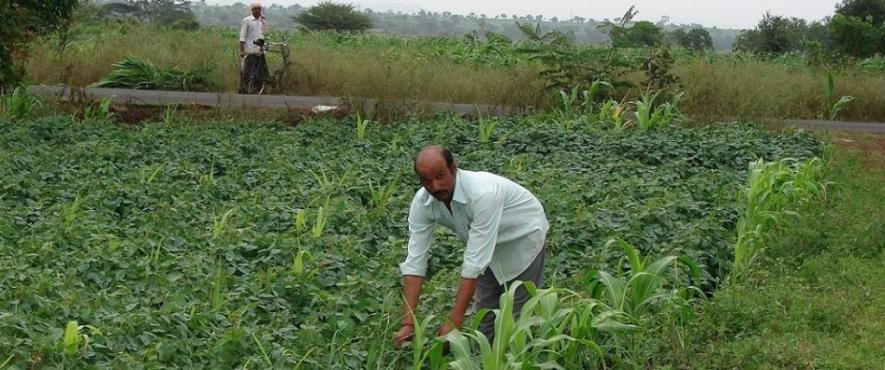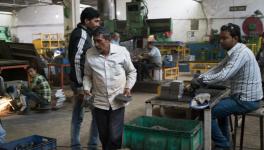Organic Farming to Bring Holistic Growth

Image Courtesy: Down To Earth
Organic farmers and “swadeshi” voters are jubilant ever since the agriculture minister announced measures to promote agro-ecology and natural farming to accelerate inclusive economic growth in India. Even the staunch opponents of agro-ecology or organic farming are shyly falling in line, as the 2020-21 budget promise of raising organic farming to 20 lakh hectares and the stress on using natural fertilisers to reorient our food production system was reiterated.
Hopefully, an additional 5 lakh hectares, the target set by the Union budget, will be added in a year. This would be the beginning of a paradigm shift from the Green Revolution led by chemicals, hybrid seeds and fertilisers. This step is a potential win-win for farmers and the environment, which can drastically reduce the Rs. 80,000 crore fertiliser and pesticide subsidy.
The government wants to hit the road not taken and steer India towards a pioneering role in organic agriculture and organic food export. APEDA has estimated that India’s organic food export will go up to US$ 50 billion by 2025 (Sikkim is already the world’s first organic state). Of course there are great challenges on the way, especially when we compare the figures of global acerage under organic cultivation, availability of organic farm inputs such as seeds, bio-pesticides, and training as well.
The big question is: will farm production fall in the shift towards organic farming? What about the impact on farmers’ incomes? These obstacles can be overcome as organic farms mostly produce their own manure, control agents and so on, and follow diversified multi-cropping cultivation. The economics of a diverse farm are completely different from a mono-culture-based farm. One acre of organic farms, especially for instance in the Doon Valley, have quadrupled farmers’ incomes and reduced input costs to almost zero over time. So along with organic farming, if we adopt organic systems, we can easily overcome the challenges for all of India.
The government should begin this journey by bringing in a new organic seed policy, because simply untreated (for instance with fungicides) seed is not “organic”. We need a framework for organic seed production that is based on advanced protocols of evolutionary participatory breeding (EPB). The Indian organic seed sector is still nascent, while globally the organic seed sector is burgeoning, and is pegged to reach $5.4 billion by 2024.
Organic seed production is well established in the United States and Germany, and both nations have strong policies on heirloom, open-pollinated and organic seeds. India, too, can look into it, and promote rural seed entrepreneurs to work with state agricultural universities and other public institutions to co-evolve more varieties that suit their micro-climate and palate. Given the genetic diversity of our crops and wild varieties, organic seed production clusters, especially in eco-zones, can quadruple farm incomes as farmers will become seed-breeders too. Currently, we have not even unleashed 1% of India’s genetic potential.
As the new Seed Bill 2019 is pending before Parliament. The government can use this opportunity to include a special clause for organic seeds and introduce different sets of rules for the sector. The next stop down this road must be residue-testing: Indian organic produce gets rejected due to a plethora of toxic residues that are found in it. This needs to be countered, first by creating organic and multi-crop clusters, and next by empowering farmers through the panchayats to vote and legally convert their blocks and villages into organic clusters. This will reduce residues. The government can back this up by creating ample facilities for residue-testing near organic zones.
The Finance Minister has previously announced that areas along the Ganga will be used to organically grow medicinal plants, herbs and so on. Similar schemes should be extended to all major rivers. Bihar already has introduced the “Jaivik Setu” scheme. This will help contain the excessive chemical run-offs into the water systems. The government can introduce a special “Ganga Organic” brand to ensure that farmers get fair prices for their produce and also the eco-services provided to our river system. The government may procure a certain quota of food into government-run canteens which directly source from organic Farmer-Producer Organisations along the Ganga river system.
Additionally, the government can introduce special MSP for organic produce, to ensure that farmers are not cheated by the organic food industry. Globally, we see that large organic corporates are enforcing unfair contracts upon organic farmers too. The government needs to act in advance, and prevent any corporate takeover of the Indian organic sector too.
The Indian Participatory Guarantee System (PGS) for organic certification and third-party certification alongside should be equivalent to Global GAP standards and the government should provide financial assistance to ensure that the maximum number of farmers go back to growing food organically. The European Union and United States are both high-value markets and hence their organic standards and India’s should be equivalent.
For years the Indian government has subsidised farmers for adopting fertilisers and toxic pesticides. Now it is time to resile those decisions. Organic farmers need to be given money for eco-services such as cleaner air, water and carbon sequestration. Overall, the Indian government can earn billions of carbon credits if 20 lakh hectares become fully organic. This move may invite investments from climate funds and global organic supply chains too.
But can India synchronise the ancient wisdom and modern agronomy and science? In many instances, they both arrive at the same conclusion, so it should be easy to bridge the gap. But a key role needs to be played by public institutions such as ICAR and state agricultural universities. Agricultural scientists after the 1960s have treated organic and agro-ecology at best as a hobby, but even stalwarts such as MS Swaminathan are now going back to praise biodiversity-based methods in farming. The syllabi at our public institutions need to be changed to lay stress on agro-ecology and emphasise on bio-pesticides and naturally-derived nano-fertilisers. This is the way of the future.
The big impediment to scientific research on agro-ecology in India is the lack of institutions and courses available for students and researchers. The government needs to liberalise private agricultural pedagogy by allowing private colleges to teach and research organic agriculture. We need BSc and MSc degrees in agro-ecology in India too. This will also help create jobs and increase the scope of agricultural R&D within India. We should use this opportunity to create the world’s first public university devoted to agro-ecology and biodiversity-based sciences, which celebrate the knowledge traditions of India and simultaneously sync them with modern sustainable agriculture.
If the government goes through with its mission of organic India, we will not only achieve inclusive growth, but also quell the rising food habits-related disease graph. Through Organic India, we can start a new Evergreen Revolution—Jaivik Kranti—providing nourishment, health and rising incomes. We can demonstrably feed two Indias, if all of our land becomes organic. If all goes well, potentially, we could double our exports target—$100 billion—and also to a remarkable extent reverse agrarian pollution and climate change.
The author is director, policy and outreach, National Seed Association of India. The views are personal.
Get the latest reports & analysis with people's perspective on Protests, movements & deep analytical videos, discussions of the current affairs in your Telegram app. Subscribe to NewsClick's Telegram channel & get Real-Time updates on stories, as they get published on our website.
























